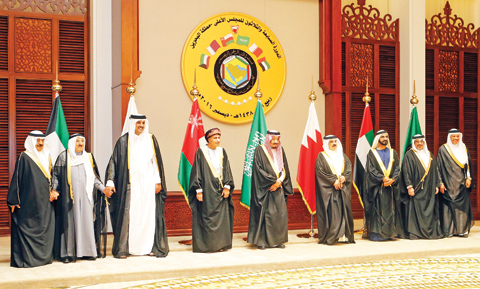British PM joins Gulf summit for post-Brexit talks
 MANAMA: Gulf Cooperation Council (GCC) leaders pose for a group picture during a GCC summit in the Bahraini capital yesterday - AFP/KUNA
MANAMA: Gulf Cooperation Council (GCC) leaders pose for a group picture during a GCC summit in the Bahraini capital yesterday - AFP/KUNAMANAMA: HH the Amir Sheikh Sabah Al-Ahmad Al-Jaber Al-Sabah said yesterday the Gulf Cooperation Council summit comes amid rapid international changes and critical conditions that necessitate continuing consultations and joint coordination to consider and preclude relevant reflections on GCC countries. Addressing the 37th GCC summit in Manama, the Amir said that the region is currently faced with grave challenges, where on the economic front, dwindling oil prices are a major concern.
HH the Amir also added that there needs to be a shift in national ideologies, together with fresh fields of cooperation in order to cope with these challenges. He spoke of notable achievements brought about by joint GCC work, which includes economic gains that represent the aspirations of GCC citizens. He also highlighted the need for increased strategies to bolster GCC cooperation in an effort to amass further accomplishments that will reinforce solidarity among the Gulf nations.
Moreover, on the scourge of terrorism, Sheikh Sabah said that it poses a threat to regional security and stability, which calls for concerted efforts to eliminate this mounting threat. On Yemen, HH the Amir recounted that Kuwait had hosted peace talks that aimed to restore peace in the war-torn nation, lamenting that the warring parties failed to reconcile, which induced further bloodshed.
On Syria, the Amir said that the GCC commiserates with the people of Syria, underscoring firm support of a political solution to a conflict that has remained unabated. Speaking on developments in Iraq, the Amir expressed satisfaction over the progress made in the fight against the so-called Islamic State (IS), as he wished the country a prosperous and bright future. On the Palestinian conflict, HH Sheikh Sabah regretted that efforts to establish peace remain at an impasse, noting that the international community is preoccupied with other issues.
Meanwhile, speaking on ties with Iran, HH the Amir said there needs to be constructive dialogue between the GCC and the Islamic Republic, noting that the talks should center on abidance by international law, including sovereign rights. The Amir also urged Tehran to cease meddling in the internal affairs of other nations, noting that the agenda of this GCC summit includes numerous pivotal issues.
Meanwhile, British Prime Minister Theresa May was to meet Gulf leaders for talks on trade ties after Britain leaves the European Union. King Salman of Gulf heavyweight Saudi Arabia opened the summit with a call for "doubling of efforts" to face regional challenges. May was expected to meet the leaders later yesterday before addressing the summit today, when she will become the first British premier and the first woman to attend the annual gathering of the six oil-rich GCC states.
Defense ties are also expected to be high on the agenda as Britain builds a new naval base in Bahrain. May's two-day visit comes as her government faces mounting domestic criticism that it has not done enough to avoid post-Brexit disruption to British trade, which is currently carried out under EU agreements.
"I will have the opportunity to talk to all six leaders about how we can develop our trade relationship, as well as cooperation on security and defense," May said before arriving in Manama late on Monday. Her office said May will discuss possibilities for post-Brexit free trade arrangements with the GCC states - Bahrain, Kuwait, Oman, Qatar, Saudi Arabia and the United Arab Emirates. "As the UK leaves the EU, we should seize the opportunity to forge a new trade arrangement between the UK and the Gulf," the British premier said.
Ahead of the summit, May yesterday met King Salman, Bahrain's King Hamad, HH the Amir of Kuwait Sheikh Sabah and UAE Prime Minister Sheikh Mohammed bin Rashid Al-Maktoum. In October last year, Britain began building a naval base at Mina Salman, outside Manama, its first new permanent base in the Middle East in four decades. May told 300 Royal Navy officers aboard HMS Ocean that she wanted to "step up our defense and security cooperation to keep British citizens safe at home and abroad". Britain's force already stationed in Bahrain was "a clear demonstration of the UK's enduring security commitment to the Gulf", she said. - Agencies










